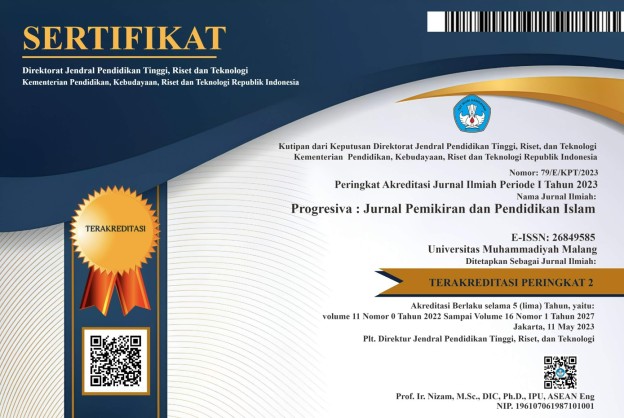Analyzing Ecotheology from The Perspective of Islam and Christianity: An Examination of Soren Kierkegaard’s Existentialism Philosophy
DOI:
https://doi.org/10.22219/progresiva.v12i01.27291Keywords:
Earth Crisis, Ecotheologhy, Islam and Christianity, Sorean Kierkegaard, TheologyAbstract
Religious teachings are closely related to the ecological dimension which, after being reinterpreted, eventually led to the term ecotheology. Through previous studies, it was found that one of the religions that contain these values is Islam and Christianity. This study aims to answer the formulation of the problem in the form of how the concept of ecotheology exists in Islam and Christianity and how to compare the concept of ecotheology in the two religions in the study of Soren Kierkegaard's existentialist philosophy. This research is a literature study with a comparative approach. The findings of this study conclude that in both religions there is a strong emphasis on the role of humans as guardians of the environment, the concept of environmental justice, the position of God as giver of responsibility, the existence of collectivity, and spiritual values. in the ecological role of humans. In Islam itself, through the Nahdlatul Ulama and Muhammadiyah organizations, the collectivity is very visible. The main difference between the two lies in the doctrinal footing and organization of the movement.
Downloads
References
Ali, A., & Muhdlor, A. Z. (2003). Kamus kontemporer Arab-Indonesia. Multi Karya Grafika.
Almu’tasim, A. (2019). Berkaca NU dan Muhammadiyah dalam Mewujudkan Nilai-Nilai Moderasi Islam di Indonesia. Tarbiya Islamia: Jurnal Pendidikan Dan Keislaman, 8(2), 199. https://doi.org/http://ejurnal.unim.ac.id/index.php/tarbiya/article/view/474
Armawi, A. (2011). Eksistensi Manusia dalam Filsafat Soren Kierkegaard. Jurnal Filsafat, 21(24), 24. https://doi.org/10.22146/jf.4738
Berger, P. L. (1991). Kabar Angin dari Langit: Makna Teologi dalam Masyarakat Modern. LP3ES.
Borrong, Robert P. (1998). Teologi dan Ekologi. BPK Gunung Mulia.
Borrong, Robert P. (2013). Etika Bumi Baru. BPK Gunung Mulia.
Borrong, Robert Patannang. (2019). Kronik Ekoteologi: Berteologi dalam Konteks Krisis Lingkungan. Jurnal Stulos, 17(2).
Consuelo. (1993). Pengantar Metode Penelitian. UI Press.
Darajat, Z. (2017). Muhammadiyah dan NU: Penjaga Moderatisme Islam di Indonesia. Hayula: Indonesian Journal of Multidisciplinary Islamic Studies, 1(1).
Fauzanto, A. (2020). Peran Muhammadiyah dan Nahdatul Ulama dalam Problematika Kerusakan Lingkungan Hidup di IndonesiaPeran Muhammadiyah dan Nahdatul Ulama dalam Problematika Kerusakan Lingkungan Hidup di Indonesia. Momentum: Jurnal Sosial Dan Agama, 9(1), 18. https://doi.org/10.29062/mmt.v9i1.59
Harari, Y. N. (2017). Sapiens: Sejarah Ringkas Umat Manusia dari Zaman Batu hingga Perkiraan Kepunahannya (Y. Musthofa (ed.)). Pustaka Alfabet.
Hardiman, F. B. (2020). Humanisme dan Sesudahnya. Kepustakaan Populer Gramedia.
Ituma, E. A. (2013). Christocentric Ecotheology and Climate Change. Journal of Philosophy, 3(1).
Jumrah, S. (2020). Studi Kasus Eksistensi Diri Orang Tua dalam Pelibatan Anak Usia Dini di Instagram. Universitas Islam Negeri Hasanuddin Makasar.
Katu, J. H. R. (2020). Teologi Ekologi: Suatu Isu Etika Menuju Eskatologi Kristen. Caraka: Jurnal Teologi Biblika Dan Praktika, 1(1), 69. https://doi.org/10.46348/car.vlil.12
Maftukhin. (2016). Teologi Lingkungan Perspektif. Dinamika Penelitian, 16(2), 346.
Maggang, E. (2019). Menampakkan Corak Biru Kekristenan Indonesia: Sebuah Perspektif Ekoteologi. Indonesian Journal of Theology, 7(2), 166. https://doi.org/10.46567/ijt.v7i2.149
Mahfud, & Patsun. (2019). Mengenal Filsafat Antara Metode Praktik Dan Pemikiran Socrates, Plato Dan Aristoteles. CENDEKIA: Jurnal Studi Keislaman, 5(1).
Mardhiah, I., Aulia, R. N., & Narulita, S. (2014). Konsep Gerakan Ekoteologi Islam: Studi Atas Ormas NU dan Muhammadiyah. Jurnal Studi Al-Qur’an, 10(1), 94.
Mufid, M. (2020). Green Fatwas in Bahtsul Masāil: Nahdlatul Ulama’s Response to the Discourse on the Environmental Crisis in Indonesia. Al-Ihkam: Jurnal Hukum Dan Pranata Sosial, 15(2), 178. https://doi.org/10.19105/al-lhkam.v15i2.3956
Musthofa, Z. A., Husamah, Hudha, A. M., Muttaqin, T., Hasanah, I., & Setyawan, D. (2017). Mengurai Sengkarut Bencana Lingkungan (Refleksi Jurnalisme Lingkungan dan Deep Ecology di Indonesia). UMM Press.
Napitupulu, N. D., Munandar, A., Redjeki, S., & Tjasyono, B. (2018). Echoteology dan Ecopedagogy: Upaya Mitigasi Terhadap Eksploitasi Alam Semesta. Voice of Wesley: Jurnal Ilmiah Musik Dan Agama, 1(2), 10. https://doi.org/10.36972/jvow.v1i2.9
Nashir, H. (2014). Memahami Ideologi Muhammadiyah. Suara Muhammadiyah.
Nasr, S. H. (2003). Antara Tuhan, Manusia dan Alam. IRCiSoD.
Parmer, D. D. (2018). Kierkegaard Untuk Pemula (A. Widyamartaya (ed.)). Kanisius.
Quddus, A. (2012). Ecotheology Islam: Teologi Konstruktif Atasi Krisis Lingkungan. Ulumuna: Journal of Islamic Studies, 16(2), 344. https://doi.org/10.20414/ujis.v16i2.181
Rafly, F. M. S., Muhlas, & Munir. (2022). Analisis Teologi Lingkungan Seyyed Hossein Nasr Terhadap Krisis Air di Masyarakat Batujaya Karawang. Jurnal Riset Agama, 2(3), 45. https://doi.org/10.15575/jra.v2i3.18278
Rakhman, A. B. (2013). Teologi Sosial; Keniscayaan Keberagamaan yang Islami Berbasis Kemanusiaan. Esensia: Jurnal Ilmu-Ilmu Ushuluddin, 14(2), 162. https://doi.org/10.14421/esensia.v14i2.755
Ridwanuddin, P. (2017). Ekoteologi dalam Pemikiran Badiuzzaman Said Nursi. Lentera: Jurnal Ilmu Dakwah Dan Komunikasi, 1(1). https://doi.org/10.21093/lentera.v1i01.832
Sabarudin, Musallamat, R., Rahman, N., Lisnawati, & Qosim, H. (2017). Islam dan Lingkungan Hidup. Lembaga Pengembangan Tilawatil Qur’an (LPTQ).
Sandu, D. (2005). Eastern Orthodox Theology and Practices Related to Ecological Issues. European Journal of Science and Theology, 1(2), 39.
Telaumbanua, S. (2020). PAK Gereja Dalam Konteks Lingkungan Hidup Suatu Refleksi Terhadap Markus 16:15. Jurnal Shanan, 4(1). https://doi.org/10.33541/shanan.v4i1.1767
Tjaya, T. H. (2018). Kierkegaard dan Pergulatan Menjadi Diri Sendiri. Kepustakaan Populer Gramedia.
Tomusu, A. Y. (2021). Fondasi Etika Ekologi dari Perspektif Teologi Kristen. Sesawi: Jurnal Teologi Dan Pendidikan Kristen, 2(2), 4. https://doi.org/10.53687/sjtpk.v2i2.54
WALHI. (2022). Membangkang Konstitusi, Mewariskan Krisis Antar Generasi. Eksekutif Nasional Walhi.
Warsito, W., & Muttaqin, H. (2012). Humanisme Dan Petaka Modern. Jurnal Sosiologi Islam, 2(2). https://doi.org/10.15642/jsi.2012.2.2.%25p
Zed, M. (2008). Metode Penelitian Kepustakaan. Yayasan Obor.
Downloads
Published
How to Cite
Issue
Section
License
Copyright (c) 2023 Aditama Aditama, Nafik Muthohirin, Muhammad Rafliyanto

This work is licensed under a Creative Commons Attribution-ShareAlike 4.0 International License.


















